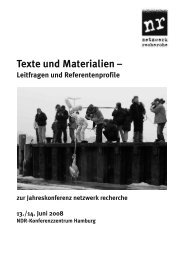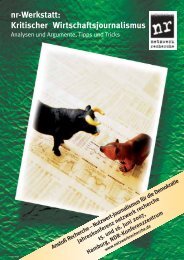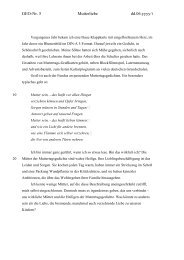Themen, Referenten, Materialien - Netzwerk Recherche
Themen, Referenten, Materialien - Netzwerk Recherche
Themen, Referenten, Materialien - Netzwerk Recherche
Erfolgreiche ePaper selbst erstellen
Machen Sie aus Ihren PDF Publikationen ein blätterbares Flipbook mit unserer einzigartigen Google optimierten e-Paper Software.
von Befehlen aus der Google-Syntax, die Verwendung von Search-Makros, “eigene” Suchmaschinen bauen und<br />
vieles mehr.<br />
Mit: Marcus Lindemann<br />
R3<br />
Samstag, 2. Juli, 16:00<br />
Datenjournalismus – Zwischen Hype & Hoffnung<br />
Datenjournalismus ist in aller Munde, Redaktionen bilden Teams aus Journalisten, Programmierern und Grafikern,<br />
um ihren Lesern/Zuschauern/Nutzern Datenjournalismus-Geschichten zu bieten. Doch Journalisten haben schon<br />
immer mit Daten gearbeitet – was genau ist neu am Datenjournalismus? Woher bekommen Journalisten die Daten<br />
– sind deutsche Behörden, die öffentliche Hand bereit, Daten sinnvoll zur Verfügung zu stellen? Wie sollten sich<br />
Journalisten und Redaktionen auf das Thema einstellen – müssen Journalisten jetzt programmieren können?<br />
Mit: Brigitte Alfter, Daniel Dietrich, Gerd Kamp, Lorenz Matzat, Matthias Spielkamp<br />
Raum R4<br />
R4<br />
Samstag, 2. Juli, 10:15<br />
Über Grenzen hinaus–Transnationale <strong>Recherche</strong>n<br />
Was haben EU-Fördergelder, Waffenschmuggel und Fußball gemeinsam? Sie alle spielen sich nicht nur im nationalen<br />
Rahmen ab. Aber was bedeutet das für investigative <strong>Recherche</strong>n? Bieten sich einige <strong>Themen</strong> eher an als<br />
andere? Sind transnationale Teams entscheidend oder schlichtweg elitär? Wie wichtig sind hierbei Webtools?<br />
Und verändern sich durch transnationale <strong>Recherche</strong>n auch Erzählstrukturen?<br />
Mit: Annamarie Cumiskey, Blaz Zgaga, Eric Mwamba Jibikilay , Nina Schulz<br />
Questions to Mark Shapiro, Senior Correspondent, Center for Investigative Reporting<br />
Mark Shapiro kann, anders als geplant, aus persönlichen leider nicht an unserer Konferenz teilnehmen.<br />
Why do you regard it as necessary to conduct transnational investigations?<br />
It is necessary because money—and the power linked to it—travels routinely across international borders. In an<br />
era when corporations operate on a global scale—from the production process to tucking away profits in far-off<br />
locations—and political developments have ripple effects across the map, it is essential that journalists have the<br />
ability to follow the trail. A decision made in Frankfurt may influence the life of someone in Turkey or Bangladesh,<br />
just as decisions or corporate actions in Washington will likely ripple very rapidly back to Germany, China, or<br />
Libya. Without an understanding of the international ebb and flow of private power, and the nature of private<br />
influence on political figures on a global scale, such a dynamic would happen in the dark—never a good idea.<br />
Are there specific issues which lend themselves more to transnational research endeavours than others?<br />
The trans-national dimension is most evident in such areas as the environment, which are inherently transnational<br />
in scope; the operations of multinational corporations; and immigration. In all of these instances, there<br />
is a clear trans-national dimension. To grasp the global potential of a story, assess the interests of the key player<br />
you’re looking at and determine whether there’s a reasonable expectation that he/she has an interest outside of<br />
your country that is implicated in whatever it is you’re investigating.<br />
To what extent do transnational investigations open up new possibilities of cooperation? And when do they run<br />
the risk of becoming elitist?<br />
Transnational investigations can often benefit enormously from cooperation. With journalists working in different<br />
countries on the same or similar stories, one will understand far better than the other the conditions in his/her<br />
country—the players, the context, how to obtain documents, etc. and will certainly be able to contribute a greater<br />
understanding of the significance of the findings in a national context. Second, given that each is operating in<br />
their own national markets, they generally can work together without competing—and can share information to<br />
be put to use in each country, for each different nationally-based media (of course with appropriate credit). The<br />
challenge in such situations is to provide a coherent narrative voice that is in some ways a mixed cocktail of the<br />
two or three or more journalists working on the story—or, alternatively, running different versions of the same<br />
story in different national markets.<br />
As to the risks of elitism. The very nature of international journalism is arguably an elite enterprise—those of<br />
us fortunate to do it occupy a unique space in the journalistic landscape. To the extent, however, that we can<br />
give voice to those impacted by decisions and policies in distant lands, that is part of the point of our work:<br />
Investigative journalists tell the third or fourth draft of history, peeling away the many interests involved to either<br />
challenge the common wisdom or offer new revelations never before considered. Often that involves giving voice<br />
to people who are the victims of decisions and policies taken far away and would otherwise never be heard.<br />
In the big picture, there is no question that the magazines, newspapers, television, radio and websites we work<br />
for are part of a rapidly bifurcating media universe: plenty of information for those who have the funds to pay for<br />
it, and likely far less for those who do not. We need to keep this in mind moving forward.<br />
How important are webtools and internet platforms for the cooperation during the research and during the<br />
presentation of the results? What kind of chances do those tools offer?<br />
Yes, the web makes it possible to research stories in distant lands without leaving your office. I use many such<br />
sources depending on the story, from UN databases to EU studies to maritime reports on the registration of<br />
ships (equasis.org) to scientific studies published in foreign journals to financial reports from foreign banks to<br />
foreign newspapers. There are also a number of new web resources, like the Investigative Dashboard, which offer<br />
insights into foreign financial databases around the world. And wobbing.eu is a great source for learning how to<br />
utilize the public information laws throughout Europe.<br />
Do transnational stories change the art of story telling?<br />
Transnational stories generally require a sense of simultaneity in distinctly different locales—told either explicitly<br />
or implicitly. One of the challenges is how to judge the credibility of sources in a foreign country where you may<br />
not be as familiar with the subtleties of people’s motives as you are at home. You may need to explain a foreign<br />
source’s position or the context in which they’re operating in greater depth than may be necessary in a national<br />
story in which such things can be implied.<br />
Developing scenes that are quite foreign to your audience can also be used to heighten dramatic effect. Bringing<br />
a foreign place to life can add richness and depth to a story, and be an interesting and creative challenge.<br />
Questions to Eric Mwamba Jibikilay (Chairman of the Forum for African Investigative Reporters FAIR and General<br />
Director of Africa Media 21, Ivory Coast).<br />
Why do you regard it as necessary to conduct transnational investigations?<br />
In a globalized world, there are hardly any important issues that do not transcend national borders. Poverty,<br />
bribery, pollution, availability of medicines all have international ramifications. In Africa we see that corruption<br />
expose‘s of one politician are not wide enough in scope. Corruption is systemic, not just in countries but in the<br />
world, and it is aided and abetted by international structures such as organized crime and development aid. So<br />
even to investigate corruption in Africa nowadays we can‘t be satisfied with a local approach.<br />
We can only get to the full truth if we employ the necessary scope. Otherwise we will only ever lift a very small tip<br />
of any veil. Secondly, even for local rulers in Africa to feel the impact of investigative expose‘s, it is important that<br />
they are published more widely than only in the rulers‘ own region or country. He can suppress media where he is,<br />
but he is really hurt when he is exposed on a larger level.<br />
Are there specific issues which lend themselves more to transnational research endeavours than others?<br />
Obviously if you investigate a perpetrator, of abuses, or pollution, who only operates locally, then there is no<br />
point in involving more countries. You should expose them locally. But as said, many injustices nowadays<br />
are perpetrated within a global framework. For instance, the fact that the Nigerian state can not monitor and<br />
combat pollution caused by Shell, is not just a Nigerian issue, though the Nigerian state is clearly failing. African<br />
elites and state machineries are generally useless. It is not a question of not having money. Nigeria is very rich.<br />
Something else is going on with failing states and useless elites in Africa. In the end, what I am saying, is that<br />
most issues of national importance, at least in Africa, need a global perspective. If we investigate a reverend<br />
who exploits children, I‘d say we need to investigate that on both local and global levels. The local investigation<br />
would focus on how bad this reverend is and that he should got to jail. It should focus on getting the police to<br />
arrest this guy. But there is again an international aspect to it. The ineffective police is part of an ineffective state<br />
machinery, and here again we see the general problem of ineffective state machineries in Africa. Quite possibly<br />
that ineffective government is receiving western aid. We have to question that, too, and I think the west wants<br />
to question that, too. Data mining on money flows on both sides of the world will deliver interesting results with<br />
68 69


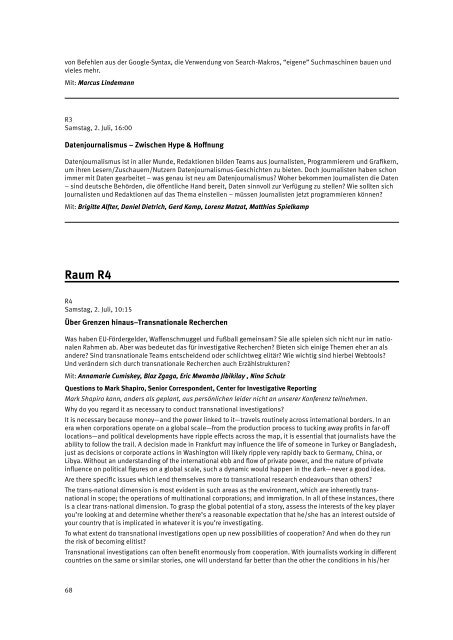
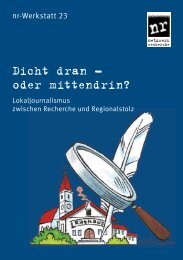
![Kurzbiografien der Referenten und ihre Themen [PDF] - Netzwerk ...](https://img.yumpu.com/21354886/1/184x260/kurzbiografien-der-referenten-und-ihre-themen-pdf-netzwerk-.jpg?quality=85)
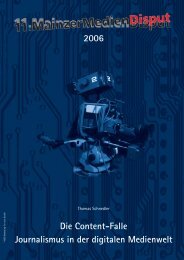
![Rede Frank A. Meyer [PDF] - Netzwerk Recherche](https://img.yumpu.com/21238543/1/184x260/rede-frank-a-meyer-pdf-netzwerk-recherche.jpg?quality=85)

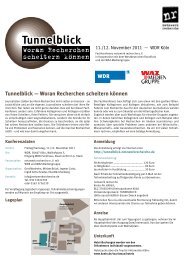
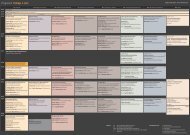

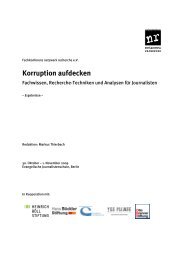
![Die stille Macht [Text] (381 S., 2.142 - Netzwerk Recherche](https://img.yumpu.com/7467581/1/184x260/die-stille-macht-text-381-s-2142-netzwerk-recherche.jpg?quality=85)

